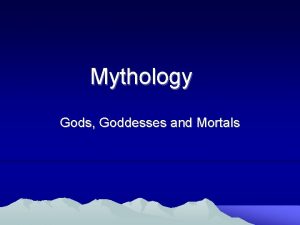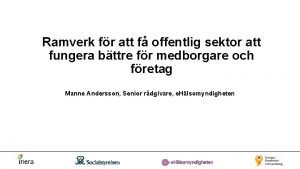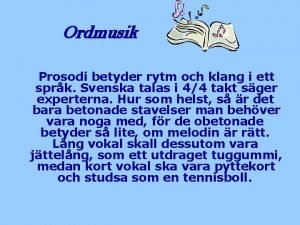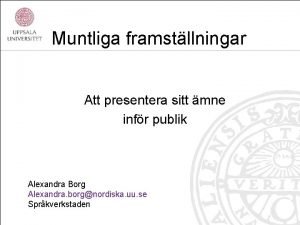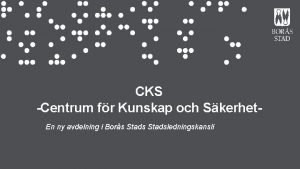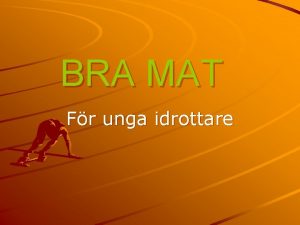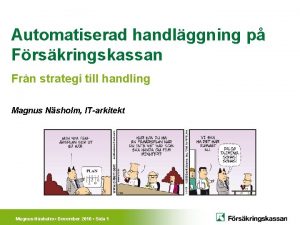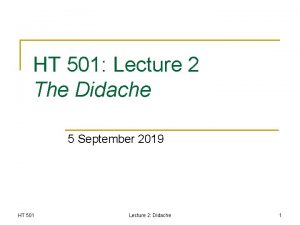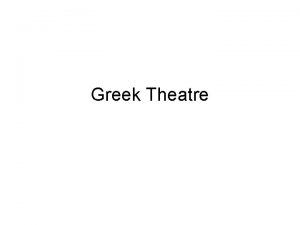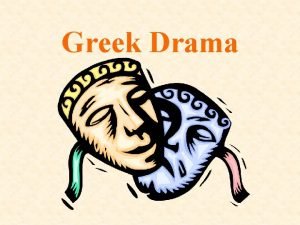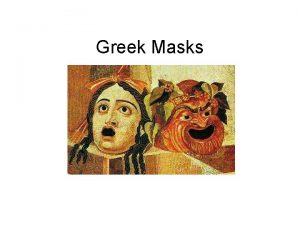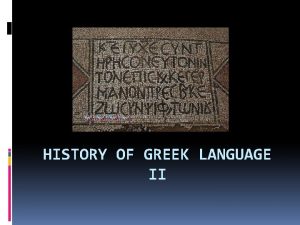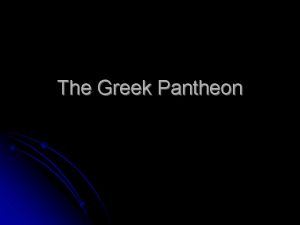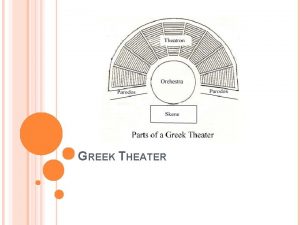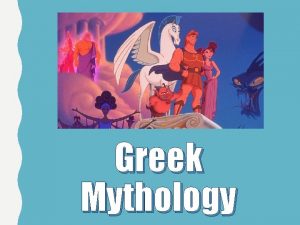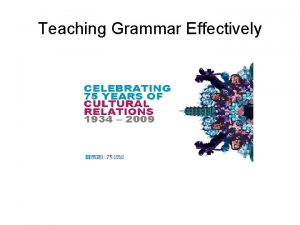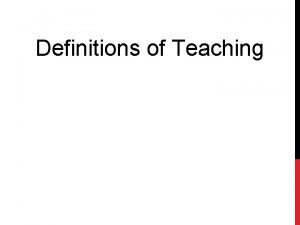Review The Didache Greek for teaching is the
































- Slides: 32


Review • The Didache (Greek διδαχῇ for “teaching”) is the oldest surviving handbook of church discipline. Approximately when do we think it was written? – AD 100 • Skeptics sometimes try to present this as one of the “lost books of the Bible”. They like to point out all the things that are not talked about in it, like the deity of Christ, and then argue that early Christians only kept the books that taught their pet doctrines and ignored the rest. What’s wrong with that line of argument? – There is nothing in the Didache to indicate that it was written by, or in association with, an apostle or that it’s authors viewed themselves as writing scripture. – The Didache was not written as a theological treatise, it is clearly a discipline manual written to help pagans understand live out Biblical ethics.

Review • The Didache opens by describing “two ways. ” What are the two ways? – The way of life and the way of death; i. e. the way of obedience to God and the way of disobedience. • The Didache quotes from a wide range of biblical concepts, but a very large portion of the concepts in Part 1, which we looked at last week, seem to come from which portion of scripture? – The synoptic gospels, especially the Sermon on the Mount. – A close second might be the book of James. • We saw that the Didache strongly emphasizes the importance of biblical giving. But it also gave surprisingly strong condemnation of something related to giving. Do you remember what it was? – It condemned people asking for a handout who do not have a genuine need and even implied that such individuals would be imprisoned and until they’d given back what they’d received!

Review • The Didache explicitly condemned a sinful practice that was all too common in that day – a practice that in our day is strongly advocated by modern feminists and liberal Democrats. What sinful practice might that be? – Abortion • How does the Didache say you should view the “accidents that befall you”? – You shall receive them as “good”, knowing that nothing is done without God. • What does the Didache say you should not withhold from your son or daughter? – Teaching them the “fear of the Lord” from their youth.

The Didache Part 2 http: //living-faith. org/2017/11/10/the-didache/

*The Didache Concerning the Eating of Food Sacrificed to Idols: 6: 4 But concerning eating, bear that which you are able; 6: 5 By all means abstain from meat sacrificed to idols; 6: 6 For it is the worship of dead gods. • I see this as differing with what the Apostle Paul says on the subject: … as to the eating of food offered to idols, we know that “an idol has no real existence, " and that "there is no God but one…” However, not all possess this knowledge. But some, through former association with idols, eat food as really offered to an idol, and their conscience, being weak, is defiled. Food will not commend us to God. We are no worse off if we do not eat, and no better off if we do. But take care that this right of yours does not somehow become a stumbling block to the weak. (1 Cor. 8: 4 -9). *http: //www. orthodox. cn/patristics/apostolicfathers/didache_en. htm

*The Didache Instructions Concerning Baptism: 7: 1 But concerning Baptism, this is how you shall baptize. 7: 2 Having first recited all these things, baptize in running water in the name of the Father and of the Son and of the Holy Spirit. • Baptism in “running water (like a river)” would presumably involve immersion. • And it probably would not involve infants. • Notice too the use of the Trinitarian formula in baptism as prescribed by Jesus in Mat. 28: 19. *http: //www. orthodox. cn/patristics/apostolicfathers/didache_en. htm

*The Didache Instructions Concerning Baptism (continued): 7: 3 But if you do not have running water, then baptize in other water; 7: 4 And if you are not able in cold, then in warm. 7: 5 But if you have neither, then pour water on the head three times in the name of the Father and of the Son and of the Holy Spirit. • Baptism in running water (such as a river) is recommended as preferable, but not a requirement. • The preference for cold water over warm is interesting! • They allow for pouring as a mode of baptism, but only as a concession if a sufficient amount of water is not available for full immersion. • The Didache seems to envision three iterations of baptism: one for each member of the Trinity. *http: //www. orthodox. cn/patristics/apostolicfathers/didache_en. htm

*The Didache Instructions Concerning Baptism (continued): 7: 6 But before the Baptism, let him that baptizes and him that is baptized fast, and any others also who are able; 7: 7 And you shall order him that is baptized to fast a day or two before. • They required their baptismal candidates to fast prior to baptism along with “others also who are able”. • This is not a scriptural requirement, but it does seem indicative of a serious attitude towards baptism on their part. *http: //www. orthodox. cn/patristics/apostolicfathers/didache_en. htm

*The Didache Instructions Concerning Fasting: 8: 1 And let not your fastings be with the hypocrites, for they fast on the second and the fifth day of the week; 8: 2 But do you keep your fast on the fourth and on the preparation day. • “Preparation day” = Friday • The “hypocrites” mentioned here may be a reference to the Jews of that day. • In the parable of the Publican and the Pharisee in Luke 18, the Pharisee reminds God "I fast twice a week. " • Both Jews and Christians in that day fasted twice a week, but on different days: – – • Jews on Monday and Thursday Christians, in contrast with the Jews, on Wednesday and Friday. So what we may be seeing here is a warning/rebuke to Christians who continued to observe Jewish customs. *http: //www. orthodox. cn/patristics/apostolicfathers/didache_en. htm

*The Didache Instructions Concerning Prayer: 8: 4 Our Father, Who are in heaven, hallowed be Your name; 8: 5 Your kingdom come; 8: 6 Your will be done, as in heaven, so also on earth; 8: 7 Give us this day our daily bread; 8: 8 And forgive us our debt, as we also forgive our debtors; 8: 9 And lead us not into temptation, but deliver us from the evil one; 8: 10 For Yours is the power and the glory for ever and ever. 8: 11 Pray this three times in the day. • In our day we tend to shy away from repeated use of rote prayers, for fear of violating Jesus’ warning to avoid “vain repetitions” (Mat. 6: 7 KJV) *http: //www. orthodox. cn/patristics/apostolicfathers/didache_en. htm

*The Didache Instructions Concerning the Eucharist: 9: 1 But as touching the Eucharistic thanksgiving give you thanks thus. 9: 2 First, as regards the cup: 9: 3 We give You thanks, O our Father, for the holy vine of Your son David, which You made known to us through Your Son Jesus; 9: 4 Yours is the glory for ever and ever. • The “Eucharistic thanksgiving” (from the Greek word eucharisteo – “to give thanks”) refers to what we commonly call “The Lord’s Supper” • Unfortunately, the word “Eucharist” was stolen from us by the Catholics. It just means “to give thanks”. • By the way, the word “mass” (which is what the Roman Catholics call their church service) comes from the word for “dismissal”. Before they had the Lord’s Supper (or Eucharist), they used to “dismiss” the people who couldn’t partake. *http: //www. orthodox. cn/patristics/apostolicfathers/didache_en. htm

*The Didache Instructions Concerning the Eucharist (continued): 9: 5 Then as regards the broken bread: 9: 6 We give You thanks, O our Father, for the life and knowledge which You did make known to us through Your Son Jesus; 9: 7 The glory is Yours for ever and ever. 9: 8 As this broken bread was scattered upon the mountains and being gathered together became one, so may Your Church be gathered together from the ends of the earth into Your kingdom; • “Mountains” apparently was a common figure of speech meaning “nations. ” *http: //www. orthodox. cn/patristics/apostolicfathers/didache_en. htm

*The Didache Instructions Concerning the Eucharist (continued): 9: 1 But as touching the Eucharistic thanksgiving give you thanks thus. 9: 9 For Yours is the glory and the power through Jesus Christ for ever and ever. 9: 10 But let no one eat or drink of this Eucharistic thanksgiving, except those who have been baptized into the name of the Lord; 9: 11 For concerning this also the Lord has said: 9: 12 Give not that which is holy to the dogs. • Here the Didache aplies Jesus’ teaching to not give dogs what is holy, and do not throw your pearls before pigs (Mat 7: 6) to not giving the Lord’s Supper to unbelievers. • Notice there is nothing here about transubstantiation. *http: //www. orthodox. cn/patristics/apostolicfathers/didache_en. htm

*The Didache Instructions Concerning the Eucharist (continued): 10: 1 And after you are satisfied thus give you thanks: 10: 2 We give You thanks, Holy Father, for Your holy name, which You have made to tabernacle in our hearts, and for the knowledge and faith and immortality, which You have made known unto us through Your Son Jesus; 10: 3 Yours is the glory for ever and ever. 10: 4 You, Almighty Master, did create all things for Your name's sake, and did give food and drink unto men for enjoyment, that they might render thanks to You; 10: 5 But did bestow upon us spiritual food and drink and eternal life through Your Son. 10: 6 Before all things we give You thanks that You are powerful; 10: 7 Yours is the glory for ever and ever. *http: //www. orthodox. cn/patristics/apostolicfathers/didache_en. htm

*The Didache Instructions Concerning the Eucharist (continued): 10: 8 Remember, Lord, Your Church to deliver it from all evil and to perfect it in Your love; 10: 9 And gather it together from the four winds -- even the Church which has been sanctified -- into Your kingdom which You have prepared for it; 10: 10 For Yours is the power and the glory for ever and ever. 10: 11 May grace come and may this world pass away. 10: 12 Hosanna to the God of David. 10: 13 If any man is holy, let him come; 10: 14 If any man is not, let him repent. Maranatha. Amen. 10: 15 But permit the prophets to offer thanksgiving as much as they desire. • “Maranatha” is from two Aramaic words meaning, “The Lord is coming” • The “prophets”, in this context, probably refers to preachers or proclaimers (cf. 1 Cor. 14: 29 ff) *http: //www. orthodox. cn/patristics/apostolicfathers/didache_en. htm

*The Didache Instructions Concerning Traveling Teachers: 11: 1 Whoever therefore shall come and teach you all these things that have been said before, receive him; 11: 2 But if the teacher himself be perverted and teach a different doctrine to the destruction thereof, hear him not; 11: 3 But if to the increase of righteousness and the knowledge of the Lord, receive him as the Lord. • At this period of time there were traveling teachers. But there was a real concern to scrutinize these teachers. *http: //www. orthodox. cn/patristics/apostolicfathers/didache_en. htm

*The Didache Instructions Concerning Traveling Teachers (cont. ): 11: 4 But concerning the apostles and prophets, do according to the ordinance of the Gospel. 11: 5 Let every apostle, when he comes to you, be received as the Lord; 11: 6 But he shall not abide more than a single day, or if there be need, a little more. 11: 7 But if he abide three days, he is a false prophet. 11: 8 And when he departs, let the apostle receive nothing except bread, until he finds shelter; 11: 9 But if he asks for money, he is a false prophet. • There was obviously concern about financial abuse on the part of the traveling teachers. *http: //www. orthodox. cn/patristics/apostolicfathers/didache_en. htm

*The Didache Instructions Concerning Traveling Teachers (cont. ): 11: 10 And you shall not put to a test nor discern any prophet speaking in the Spirit; 11: 11 For every sin shall be forgiven, but this sin shall not be forgiven. • A rather enigmatic couple of statements. It almost seems like the “not” should not be in 11: 10. 11: 12 Yet not every one that speaks in the Spirit is a prophet, but only if he have the ways of the Lord. 11: 13 From his ways therefore the false prophet and the prophet shall be recognized. 11: 14 And no prophet when he orders a table in the Spirit shall eat of it; 11: 15 Otherwise he is a false prophet. • Not sure what it means for a prophet to “order a table in the Spirit” *http: //www. orthodox. cn/patristics/apostolicfathers/didache_en. htm

*The Didache Instructions Concerning Traveling Teachers (cont. ): 11: 16 And every prophet teaching the truth, if he does not what he teaches, is a false prophet. 11: 17 And every prophet approved and found true, if he does anything as an outward mystery typical of the Church, and yet does not teach you to do all that he himself does, shall not be judged before you; 11: 18 He has his judgment in the presence of God; 11: 19 For in old times the prophets did the same. • I have no idea what the “outward mystery typical of the Church” refers to. 11: 20 And whoever shall say in the Spirit, Give me silver or anything else, you shall not listen to him; 11: 21 But if he tell you to give on behalf of others that are in need, let no man judge him. • In spite of some unclear phrases used, one thing is clear: they were very concerned about financial abuse on the part of the traveling teachers. *http: //www. orthodox. cn/patristics/apostolicfathers/didache_en. htm

*The Didache The Support of Local Elders 13: 1 But every true prophet desiring to settle among you is worthy of his food. 13: 2 In like manner a true teacher is also worthy, like the workman, of his food. 13: 3 Every first-fruit then of the produce of the wine-vat and of the threshing-floor, of your oxen and of your sheep, you shall take and give as the first-fruit to the prophets; 13: 4 For they are your chief-priests. • A “true prophet desiring to settle among you” refers to an elder who lives and ministers among them. *http: //www. orthodox. cn/patristics/apostolicfathers/didache_en. htm

*The Didache The Support of Local Elders (continued) 13: 5 But if you do not have a prophet, give them to the poor. 13: 6 If you make bread, take the first-fruit and give according to the commandment. 13: 7 In like manner, when you make a jar of wine or of oil, take the first-fruit and give to the prophets; 13: 8 Yea, and of money and raiment and every possession take the first-fruit, as shall seem good to you, and give according to the commandment. *http: //www. orthodox. cn/patristics/apostolicfathers/didache_en. htm

*The Didache Instructions Concerning Local Assemblies: 14: 1 And on the Lord's own day gather yourselves together and break bread and give thanks, first confessing your transgressions, that your sacrifice may be pure. • This is one of the earliest references to the Lord’s Day outside of scripture. 14: 2 And let no man who has a dispute with his fellow, join your assembly until they have been reconciled, that your sacrifice may not be defiled; 14: 3 For this is the same sacrifice spoken of by the Lord; 14: 4 In every place and at every time offer Me a pure sacrifice; 14: 5 For I am a great king, says the Lord, and My name is wonderful among the nations. • The need for someone to reconcile with his brother before joining the assembly is probably based on Jesus’ teaching in Mat 5: 23 -26. *http: //www. orthodox. cn/patristics/apostolicfathers/didache_en. htm

*The Didache Instructions Concerning Bishops and Deacons: 15: 1 Appoint for yourselves therefore bishops and deacons worthy of the Lord, men who are meek and do not love of money, and who are true and approved; • Notice here, as in 1 Clement which was written around the same time period, we see two offices in the church, bishops and deacons and we see a plurality of elders in the local church. 15: 2 For they also perform to you the service of the prophets and teachers. 15: 3 Therefore do not scorn them; 15: 4 For they are your honorable men, along with the prophets and teachers. *http: //www. orthodox. cn/patristics/apostolicfathers/didache_en. htm

*The Didache Instructions Concerning Church Discipline: 15: 5 And reprove one another, not in anger but in peace, as you find in the Gospel; 15: 6 And let no one speak to any who have done wrong towards his neighbor, neither let him hear a word from you, until he repent. • A reference to shunning unrepentant believers “as you find in the Gospel” (i. e. Matthew 18). *http: //www. orthodox. cn/patristics/apostolicfathers/didache_en. htm

*The Didache Instructions Concerning Prayers and Giving: 15: 7 But do your prayers and your alms-giving and all your deeds you as you find it in the Gospel of our Lord. • That is, without ostentation and in secret, unlike "the hypocrites. " See Matthew 6: 1 -6. *http: //www. orthodox. cn/patristics/apostolicfathers/didache_en. htm

*The Didache Warnings Concerning the Last Days: 16: 1 Be watchful for your life; 16: 2 Let your lamps not be quenched and your loins not ungirded, but you be ready; 16: 3 For you know not the hour in which our Lord comes. • Compare with Jesus’ warnings in Matthew 24: 36, 42, 44; 25: 13. 16: 4 And you shall gather yourselves together frequently, seeking what is fitting for your souls; • Compare with Hebrews 10: 23. 16: 5 For the whole time of your faith shall not profit you, if you be not perfected at the last season. • But the one who endures to the end will be saved (Mat. 24: 13). *http: //www. orthodox. cn/patristics/apostolicfathers/didache_en. htm

*The Didache Warnings Concerning the Last Days (continued): 16: 8 And then the world-deceiver shall appear as a son of God; 16: 9 And shall work signs and wonders, and the earth shall be delivered into his hands; 16: 10 And he shall do unholy things, which have never been since the world began. 16: 11 Then all created mankind shall come to the fire of testing, and many shall be offended and perish; • Let no one deceive you in any way. For that day will not come, unless the rebellion comes first, and the man of lawlessness is revealed, the son of destruction, who opposes and exalts himself against every so-called god or object of worship, so that he takes his seat in the temple of God, proclaiming himself to be God. (2 Thes. 2: 3 -4) *http: //www. orthodox. cn/patristics/apostolicfathers/didache_en. htm

*The Didache Warnings Concerning the Last Days (continued): 16: 12 But they that endure in their faith shall be saved by the Curse Himself. • Christ redeemed us from the curse of the law by becoming a curse for us (Gal. 3: 13). *http: //www. orthodox. cn/patristics/apostolicfathers/didache_en. htm

*The Didache Warnings Concerning the Last Days (continued): 16: 13 And then shall the signs of the truth appear; 16: 14 First a sign of an opening in the heaven, then a sign of a voice of a trumpet, and thirdly a resurrection of the dead; 16: 15 Yet not of all, but as it was said: 16 The Lord shall come and all His saints with Him. 16: 17 Then shall the world see the Lord coming upon the clouds of heaven. • Behold! I tell you a mystery. We shall not all sleep, but we shall be changed, in a moment, in the twinkling of an eye, at the last trumpet. For the trumpet will sound, and the dead will be raised imperishable, and we shall be changed. (1 Cor. 15: 51 -52) *http: //www. orthodox. cn/patristics/apostolicfathers/didache_en. htm

*The Didache Things in the Didache That I Found to Be Encouraging: • That had such a wide exposure to scripture – even in the early time. • That their theology was so spot-on in areas where things quickly went south, not very many years later: – Two church offices: bishops and deacons – A plurality of elders – Sovereignty of God even in accidents – Two ordinances in the church: baptism and the “Eucharist” – Baptism by Immersion of Adults (no mention of sprinkling infants). – The “Eucharist” was for giving thanks and remembrance of Christ – no mention of transubstantiation. – Simple Eschatology – the Lord could come at any time. *Based on notes taken from James White’s 2016 Church History Series; Lesson 8 – The Didache

The Letter to Diognetus https: //www. christianity. com/church-history/timeline/1 -300/epistle-of-diognetus-quote-11629595. html
 Definitions of micro teaching
Definitions of micro teaching The greek miracle
The greek miracle Formuö
Formuö Typiska drag för en novell
Typiska drag för en novell Nationell inriktning för artificiell intelligens
Nationell inriktning för artificiell intelligens Ekologiskt fotavtryck
Ekologiskt fotavtryck Varför kallas perioden 1918-1939 för mellankrigstiden
Varför kallas perioden 1918-1939 för mellankrigstiden En lathund för arbete med kontinuitetshantering
En lathund för arbete med kontinuitetshantering Kassaregister ideell förening
Kassaregister ideell förening Tidbok yrkesförare
Tidbok yrkesförare Sura för anatom
Sura för anatom Vad är densitet
Vad är densitet Datorkunskap för nybörjare
Datorkunskap för nybörjare Tack för att ni lyssnade bild
Tack för att ni lyssnade bild Att skriva debattartikel
Att skriva debattartikel För och nackdelar med firo
För och nackdelar med firo Nyckelkompetenser för livslångt lärande
Nyckelkompetenser för livslångt lärande Påbyggnader för flakfordon
Påbyggnader för flakfordon Arkimedes princip formel
Arkimedes princip formel Offentlig förvaltning
Offentlig förvaltning Kyssande vind analys
Kyssande vind analys Presentera för publik crossboss
Presentera för publik crossboss Teckenspråk minoritetsspråk argument
Teckenspråk minoritetsspråk argument Kanaans land
Kanaans land Treserva lathund
Treserva lathund Epiteltyper
Epiteltyper Claes martinsson
Claes martinsson Centrum för kunskap och säkerhet
Centrum för kunskap och säkerhet Programskede byggprocessen
Programskede byggprocessen Bra mat för unga idrottare
Bra mat för unga idrottare Verktyg för automatisering av utbetalningar
Verktyg för automatisering av utbetalningar Rutin för avvikelsehantering
Rutin för avvikelsehantering Smärtskolan kunskap för livet
Smärtskolan kunskap för livet

